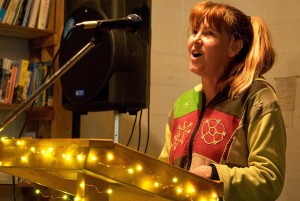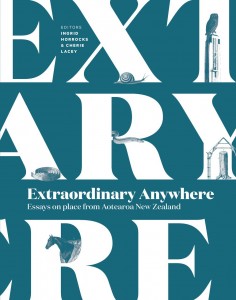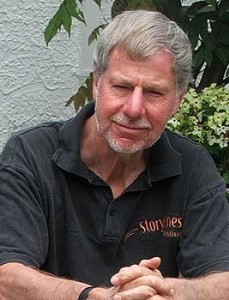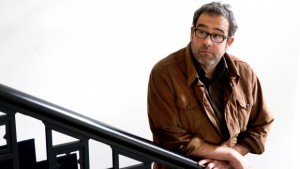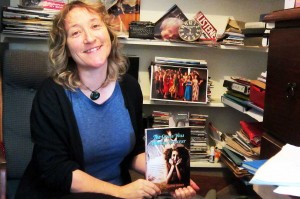A surge in activity and success among Massey University staff and student creative writers – from New Zealand, as well as the United States, Britain, Latin America and Australia – reflects the growing strength and profile of its undergraduate and postgraduate creative writing programmes, says Palmerston North-based author and creative writing senior lecturer Dr Thom Conroy.
Ex-pat writers offer a fresh take on New Zealand identity from the migrant’s experience, says Dr Conroy, a dual American-New Zealand citizen who moved here from Ohio 11 years ago.
A case in point, Dr Conroy is about to launch his second novel, titled The Salted Air, two years after the success of his debut novel The Naturalist – set mainly in New Zealand and based on the true story of 19th century German naturalist, botanist and explorer Dr Ernst Dieffenbach. It topped the Neilsen Weekly Bestseller list in New Zealand after its release in 2014 and was at one point selling ahead of Man Booker winner, Eleanor Catton’s The Luminaries. His next novel has a contemporary New Zealand setting, and will be launched in Palmerston North on June 3.
Colleagues, as well as current and former students from the School of English and Media Studies, have been gaining a profile in both publishing and arts performance across genres in fiction, poetry, creative non-fiction, and theatre and film writing.
Associate Professor Bryan Walpert has earned accolades for his poetry, both in New Zealand and overseas. Originally from Baltimore, Maryland and now a dual citizen, he came to the Manawatū 12 years ago as the first dedicated creative writing lecturer at Massey. He’s published two poetry collections and short story collection in the US. His first poetry volume to be published in New Zealand, titled Native Bird, explores deeper nuances of adaption, with observations and feelings about his children growing up in a different place to that of his own childhood. His poem, Aubade, featuring the Manawatū’s iconic wind turbines, was shortlisted for the Montreal International Poetry Prize in 2013.
“One of the great strengths of Massey’s creative writing programme,” says Dr Walpert, “is its combination of a New Zealand foundation and an international outlook, with staff who publish in multiple countries and bring to our teaching an experience and engagement with contemporary writing and aesthetics from both New Zealand and the global community of literary scholars and writers.”
Global voices and local issues
Multi international award-winning playwright Associate Professor Angie Farrow, who came to Palmerston North from England 20 years’ ago, has been inspired to write about the local environs, as well as global topics. In her 2011 play, The River, she confronted issues of sustainability and spirituality in relation to the highly polluted Manawatū River. Meanwhile, Australian-born theatre lecturer Associate Professor Elspeth Tilley’s short play, Flotsam, was performed at 10 university theatres in the US last year as part of a global theatre movement in the lead up to the Paris conference on climate change.
Poet Dr Leonel Alvarado, originally from Honduras and now head of Massey’s Spanish Language programme, is well known on the Manawatū arts set for his evocative poetry about the Manawatū river and Māori mythology. His poem, What Stones Know, is etched into a wall of the Palmerston North City Library.
As well as winning Latin American awards for his Spanish language collections, he has expressed what his new home means through poetry with the release of his first English language collection, Driving with Neruda to the Fish ‘n’ Chips, part of the Kete Series published in 2014 by HauNui Press.
Wellington press snaps up Massey poets
New Zealand publisher Mary McCallum, who heads Wellington-based Mākaro Press, recently issued a press release in praise of Massey’s poets. “Massey University creative writers are…making books that are creating ripples in the New Zealand publishing scene,” she says.
An author herself, Ms McCallum has drawn on a range of writers in commissioning work for the press, including some she worked with over the five years she tutored creative writing students at Massey’s Wellington campus and as a distance tutor.
Dr Walpert’s Native Bird was chosen for the Mākaro Press Hoopla series in 2015 along with collections by Jennifer Compton – a former Massey writer-in-residence in Palmerston North – and by Dunedin writer Carolyn McCurdie.
She has also signed contracts with more recent Massey graduates, with Ish Doney to be published this year, as well as graduates of the Masters of Creative Writing; Sue Wootton’s first novel Strip and poet Bridget Auchmuty’s first poetry collection.
New BA creative writing major launched
A milestone this year was the introduction of a new Bachelor of Arts major in Creative Writing with undergraduate offerings, including poetry, fiction, creative non-fiction, life writing, travel writing, script writing well as other creative options under the Expressive Arts pathway in theatre and film. Meanwhile, the distance Masters of Creative Writing programme, launched in 2010, is attracting more candidates each year, says Dr Conroy, who has supervised a number of writers who have gone on to win literary awards.
The number of doctoral degrees in creative writing is also on the rise, with stunning examples such as award-winning Auckland poet Dr Jo Emeney, who explored the emerging field of medical humanities and wrote a new collection of poems on her mother’s cancer diagnosis and treatment as part of her thesis. Poetry PhD candidates Sarah Jane Barnett and Tim Upperton have both been nominated for major poetry prizes.
Critical mass for creative writing
In 2016, Massey will also co-organise the second conference of the Aotearoa Creative Writing Research Network (ACWRN) with Auckland University of Technology. The first ACWRN conference, hosted by Massey at the Wellington campus in 2014, saw creative writers from across New Zealand meeting for the first time to discuss the future of the still-emerging discipline in New Zealand.
As numerous public literary events testify – from workshops, book launches, panel discussions, readings and campus arts performances to Off the Page events through to September, the Writers Read series – creative writing is flourishing across all three campuses.
The new Massey University Press, led by respected publisher Nicola Legat, will have creative writing on its upcoming list, including the next edition of Poetry New Zealand, edited by poet and senior lecturer Dr Jack Ross for the past three years. He, too, has included diverse migrant voices in the annual journal. He recognises New Zealand “poetries” as a “rich gamut of cultures and language which now exist in our islands expressing themselves in many languages and forms”, and is keen to publish more Māori poetry, in Te Reo Māori and English.
Massey may be best known for its teaching and research in sciences, social work and education, says Dr Conroy, but it also has strong – though less visible – tradition of excellence in creative writing and the humanities. “With the constant flow of student and staff successes these past few years, Massey’s creative writing programme is finally reaching critical mass,” he says. “We hope this will broaden the field of writing and expand the range of voices contributing to the literary arts in Aotearoa.”
Recent successes and upcoming events:
- Australian-born writer Sacha Jones, a creative writing student, had her memoir of growing up in Sydney, The Grass Was Always Browner, published here and in Australia in May, by Finch Publishing, Sydney.
- Poet and PhD candidate Tim Upperton was shortlisted for the 2016 Ockham Book Awards
- Recent Master of Creative Writing graduate Bonnie Etherington has been shortlisted for the Commonwealth Short Story, along with Dr Tina Makareti, former creative writing lecturer and student – the only two of 26 on the shortlist from New Zealand.
- Poet and senior Associate Professor Dr Bryan Walpert has been selected for the 2015 Best New Zealand Poems anthology, published by the International Institute of Modern Letters at Victoria University
- Dr Matthew Harris, tutor in the School of English and Media Studies, won the audience award in France’s Clermont-Ferrand International competition for his script for the short film, Madam Black. The film has won several international awards.
- Playwright Associate Professor Angie Farrow’s latest work, The Politician’s Wife, will debut at Centrepoint Theatre and Wellington’s BATS theatre in June.
- Dr Ingrid Horrocks, senior lecture in creative writing at the Wellington campus, is this year launching a collection of essays with Victoria University Press (VUP), titled Extraordinary Anywhere.
Details here for the launch of Thom Conroy’s novel The Salted Air.
